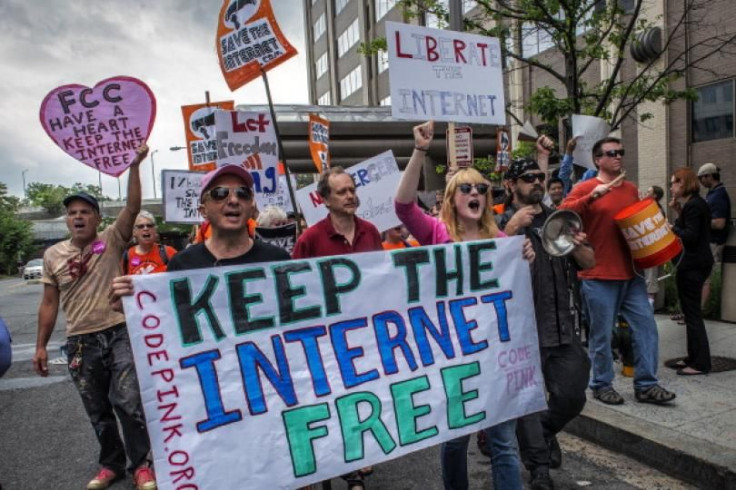Who Voted Against Net Neutrality? GOP Congress, FCC Opponents Fight Day Of Action

With Wednesday’s net neutrality Day Of Action, tech companies and legislators are making a major push in support of net neutrality. Net neutrality, which refers to policies that consider the internet to be a public utility, has been a point of contention this year between supporters and regulators. Federal Communications Commission chairman Ajit Pai has been a long-time opponent of net neutrality, saying that he wanted to take a “ weed whacker ” to in-place regulations during a December speech.
Who Voted Against Net Neutrality?
Currently, the FCC’s push to roll back net neutrality is in its early stages. In May, the Commission voted to begin its rollback of previous net neutrality protections in a 2-1 vote against party-affiliated lines. Pai and Republican Commissioner Michael O'Rielly went in support of the move, while Democratic Commissioner Mignon Clyburn opposed the move.
Read: FCC Takes First Step To Undo Net Neutrality Rules
Among lawmakers, the rollback on net neutrality is in a similarly early state. In May, Sen. Mike Lee (R-Utah) proposed the Restoring Internet Freedom Act, which would nullify current protections for net neutrality. However, the bill has seen no action from lawmakers since its initial introduction.
The current push against net neutrality comes from previous protections that were put in place by previous FCC commissioners in 2015. As part of these protections, the FCC ruled to consider the internet as a “public utility.” Net neutrality supporters have argued that the policy ensures that internet service providers cannot charge more or exhibit preferential treatment towards specific services like Netflix or Spotify. As part of the FCC’s May repeal vote, it will also re-evaluate “bright-line rules” that cover these protections.
In a statement during the initial FCC vote, the Commission blasted the 2015 policies as an overreach that limits internet service providers.
“[The 2015 net neutrality vote] appears to have put at risk online investment and innovation, threatening the very open Internet it purported to preserve,” the FCC said. “Requiring ISPs to divert resources to comply with unnecessary and broad new regulatory requirements threatens to take away from their ability to make investments that benefit consumers. The lack of clarity around what Title II requires ISPs to do further appears to harm investment and have particularly harmful effects on small ISPs.”
Read: Is Net Neutrality Dead? What The Internet Will Look Like Without Open Internet Rules, Title II
While the push against net neutrality still has some distance to go before reaching lawmakers, many have still been proactive during the Day Of Action. Democratic senators previously reached out to the FCC to make sure it guarantees that its online comment systems were functioning properly, according to TechCrunch. After the FCC’s initial May vote, its internal comment system temporarily went down at the same time that TV host John Oliver highlighted net neutrality on his HBO show.
In an op-ed in Recode, Sen. John Thune (R-S.D.) also called for lawmakers to figure out a permanent solution for open internet policy instead of relying on the FCC.
“What the internet needs to end regulatory uncertainty and recurring threats of litigation is an enduring, bipartisan law from Congress to protect internet freedom by codifying widely accepted net neutrality protections.” Thune said.
© Copyright IBTimes 2024. All rights reserved.





















